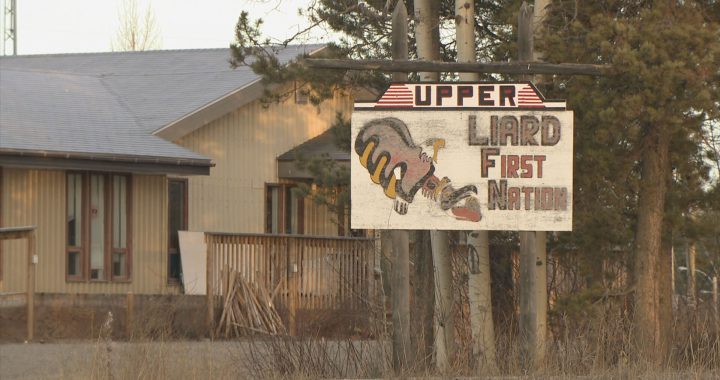(Joni Andre with her son, Frazer, in this undated photo provided by the national inquiry.)
The Northwest Territories are known for stunning natural beauty that seems to hide an ugly secret – domestic violence.
At least that’s the deadly theme emerging in Yellowknife during the National Inquiry into Missing and Murdered Indigenous Women and Girls.
“Everybody knew. We all knew what was going on,” said Jayda Andre, who testified Wednesday at the public hearings about the death of her 22-year-old sister, Joni Andre, in 2004.
Joni’s husband, Stanley Itse, was found guilty of manslaughter.
See more on the first day of MMIWG public hearings in Yellowknife:
“We should have spoken up. We knew it wasn’t OK. She loved the guy so much maybe she thought he would change,” said Jayda.
Jayda said her sister was beaten and stabbed to death in their home in Fort McPherson, a hamlet in the Inuvik region of the territory.
“There was a lot of abuse in…such a beautiful place,” said Jayda.
The community of about 800 people is still without a shelter for adults and their children fleeing abuse.
It’s one of the sorely needed social services commissioners are being told is lacking in the territory known for valuable natural resources like diamonds and gold.
Jayda recalled Joni’s last moment alive in the health centre.
“She wasn’t breathing then. She was gone,” said Jayda, sobbing, of her older sister.
“I never got to see her take her last breath. I never got to tell her how much I loved her.”
Jayda apologized for breaking down in tears on the second day of public hearings, explaining she’d been keeping most of the hurt inside since she was 15 years old.
“It’s the start of my healing journey to remember her, to honour her…It’s time that everybody gets to know who she is,” she said.
Jayda said she testified Wednesday to honour her sister – whom she called her ‘best friend’ – and to warn others who may be in the same dangerous situation.
“He ran like a coward for beating her…He had been jealous and controlling but she loved him like crazy,” she said.
The murder, for which Itse served three years despite having a lengthy criminal record, left a son without a mother.
“To me that’s ridiculous,” said Jayda. “The justice system in the North is full of shit. You can do anything to anybody and serve a few years.”
The court case was heard in the recreation centre where the community held feasts and dances. Jayda said she just a teenager and was left to go through the process alone.
A complication common in small communities, she said, is inter-personal relationships that make it hard to access what limited support there is. She said commissioners should recommend outside professionals come in during times of grief and need, as well as beefing up existing resources.
“I don’t recall much help and support given to me as a teenager,” she said. “I’m not blaming anybody for it and I’m not looking for sympathy or anything.
“There may be other survivors out there; maybe they’re not capable; maybe they’re not ready, but they shouldn’t have to find places for counselling. It should be public and be given to them.”
Now that she’s older, Jayda said she’s come to understand Joni’s relationship better – and to understand how vulnerable her sister was.
“She refused to see the bad in him. She loved him too much…I think where she would be today if she moved on – if he would let her,” she said.
This led Commissioner Brian Eyolfson to ask what help was available now for people in abusive relationships.
Jayda said there were some social services but the nearest emergency shelter was still in Inuvik – accessible by a long car road away on a bumpy road requiring expensive gasoline.
Even today, in 2018, N.W.T. doesn’t have a 9-1-1 emergency telephone system or more than five transition houses for 33 communities. Nor does it have public or private cross-territory transportation like buses.
Kmartens.ca










